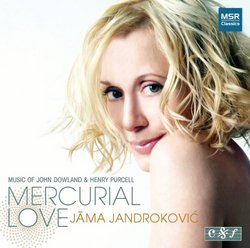| All Artists: Jama Jandrokovic Title: Mercurial Love: Music of Dowland & Purcell - Jama Jandrokovic Members Wishing: 1 Total Copies: 0 Label: MSR Classics Original Release Date: 1/1/2008 Re-Release Date: 2/5/2008 Genres: Special Interest, Classical Styles: Opera & Classical Vocal, Chamber Music, Historical Periods, Baroque (c.1600-1750), Instruments, Strings Number of Discs: 1 SwapaCD Credits: 1 UPC: 681585122228 |
Search - Jama Jandrokovic :: Mercurial Love: Music of Dowland & Purcell - Jama Jandrokovic
 | Jama Jandrokovic Mercurial Love: Music of Dowland & Purcell - Jama Jandrokovic Genres: Special Interest, Classical
Imagine a culture in which persons with even a modest education not only knew poets and musicians by name, but could also quote passages of poetry from memory. In our world, such erudition is largely the province of academ... more » |
Larger Image |
CD Details
Synopsis
Product Description
Imagine a culture in which persons with even a modest education not only knew poets and musicians by name, but could also quote passages of poetry from memory. In our world, such erudition is largely the province of academic scholars. The average audience member at a concert of vocal music depends on program notes and song texts to enhance appreciation of the performance. England in the 17th century was a different story. In addition to the aristocracy, many members of the middle class were well acquainted with both poetry and music. English composers capitalized on this knowledge, exploring ways to meld the messages of text and sound in ways that heightened sensory impact. Elizabethan and Jacobean England boasted the finest musicians in the western world and a stable of stellar composers equal to those of any other country. This disc celebrates the titans John Dowland and Henry Purcell, who stand as colossal bookends at opposite ends of the 17th century. While their individual backgrounds and careers differed, their achievement in the realm of accompanied solo song is strikingly similar. Soprano J ma Jandrokovi , harpsichordist Jory Vinikour, lutenist Charles Weaver and viola da gambist Carlene Stober have recreated an evening of music-making in a civilized and cultured household, presenting accompanied vocal music and instrumental solos. Each of these songs is a little jewel, expressed succinctly, with elegance, beauty, and refinement: a Fabergé egg, two centuries ahead of that concept. Mercurial Love explores the full gamut of life s most complex emotion: love s exhilaration and frustration, volatility and fickleness, tenderness, despair, and myriad other qualities. "Sometimes several aspects occur within a single song," observes Ms. Jandrokovic. For example, Dowland s Come again presents eager anticipation in the first stanza, mourning and weeping in the second, and ends with despair. Similarly, but with the inverse trajectory, Sweeter than Roses is chameleon-like. It first yearns, then becomes passionate, then languorous, and finally triumphant. The instrumental solos interspersed among the songs extend the mood to a more abstract realm, expressing the emotional state where the poetry and the melody lead the listener. Soprano J ma Jandrokovi has charmed audiences and critics with her clear, pure soprano voice and engaging stage presence. A versatile interpreter of song, she is equally at ease in early music, new music, Lieder and Broadway. Native to the wind-swept plains of Wyoming, she has appeared in major international concert halls including Konzerthaus Berlin, Munich's Gasteig für Kultur and New York's Alice Tully Hall and Weill Recital Hall at Carnegie Hall. Critics and audiences have thrilled to her artistry, delighting in her "lovely lyric soprano and gift for poetry" [New York Newsday] and praising her "appealingly sweet" [Opera News] and "clear and wonderful voice" [Glamour Magazine Germany]. Ms. Jandrokovi has a passion for poetry which guides her singing. She is most at home in the recital literature and has worked with the celebrated art song composer Lori Laitman and the Pulitzer Prize-winning composer Paul Moravec. This collaboration prompted Opera News critic Joanne Sydney Lesser to applaud "her genuine desire to collaborate and communicate, as well as her commendable commitment to new music." The New York Times has observed, "Give this soprano credit for putting herself on the line." She has done so again with this CD which explores her interest in early music. Neither Dowland nor Purcell leaves the singer any place to hide. Ms. Jandrokovi confronts this nakedness, exposing private feelings, thoughts and experiences through her sensuous, unique voice.

 Track Listings (20) - Disc #1
Track Listings (20) - Disc #1